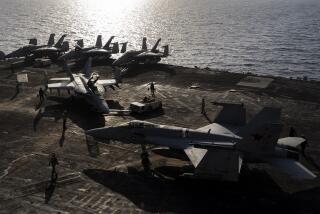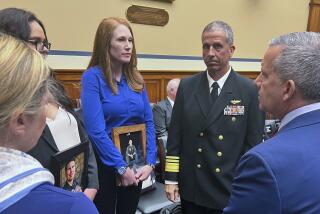Navy, Marine Officials Cite Costs for Decision Not to Upgrade Jets
- Share via
WASHINGTON — Navy and Marine Corps officials, pressed by Congress about the spate of recent crashes involving the F-14 Tomcat and AV-8B Harrier jet fighter planes, said Tuesday they have decided not to order major upgrades of those aircraft partly because of budget limitations.
In testimony before a House National Security subcommittee, they said the services would instead try to make do by improving their pilot training and flying procedures, and by installing devices designed to reduce the possibility of mechanical failures.
The officials, Adm. Jay L. Johnson, vice chief of naval operations, and Lt. Gen. Harold W. Blot, Marine Corps deputy chief of staff for aviation, said the services could not afford the billions of dollars that it would take to make major modifications to the planes.
The decisions underscored the kind of difficult trade-offs the military faces in an era when intense budget pressures have cut into weapons-modernization funds.
Congress called for the hearings after a rash of recent crashes. Three Harriers and three F-14s have crashed since the start of the year--including one F-14 that went down off the coast of Southern California Feb. 18, killing both crew members.
The Navy and Marine Corps responded by temporarily grounding portions of their air fleets to review procedures and check the airworthiness of their aircraft. They have since restricted use of the aircraft in some situations, but have eschewed expensive full-scale modifications, such as replacing existing engines.
Johnson said the Navy decided it would be too expensive to install new engines in the F-14A, an earlier model of the plane with an engine that has been plagued with problems, since the aircraft are scheduled to be phased out between 2001 and 2004.
And Blot said the Marine Corps cannot afford to complete safety-related upgrades on all of its Harriers.
Part of the services’ reluctance stems from conclusions that many of the crashes resulted primarily from human error. The Navy said last week, for example, that an F-14A crash in Nashville on Jan. 29 occurred because the pilot simply lost control.
Separately, Johnson disclosed that a Navy investigation found that the cause of the F-14A crash off the California coast was a malfunction of the afterburner, which provides extra power for emergencies. That report is scheduled to be completed this weekend.
The Navy already has restricted the use of afterburners on its later models of the F-14, except for emergency situations. And it has ordered the installation of a cockpit warning-light designed to alert the air crew to possible impending engine failure.
Johnson said, however, “we made the decision not to upgrade the engines” because they would be “too expensive to put in an aircraft which would be removed from service a few years after being re-engined.” Neither he nor Navy officials provided a price tag for the upgrade.
At the same time, Blot said, the Marine Corps had decided to limit major upgrades of its Harriers to 72 of the aircraft, leaving 24 without new-model engines. “It was done because of the fiscal constraints that were placed on the program,” he said.
Blot said upgrading the 72 Harriers was costing the Marine Corps about $2 billion. Buying entirely new Harriers would cost the Pentagon $36 million each.
The testimony brought a sharp reaction from the subcommittee’s chairman, Rep. Duncan Hunter (R-El Cajon), who said he would consider drafting legislation to increase the defense budget to finance the upgrades for both aircraft.
Navy and Marine Corps officials have been insisting that despite the problems, the services have steadily improved the safety record of their aircraft in recent years, and the performance so far has been in line with that pattern.
Rep. Ike Skelton (D-Mo.), a ranking Democrat on the panel, said new figures from the General Accounting Office showed there were 76 military air crashes in 1995, down from 309 just 20 years ago. He said human error was a factor in 75% of last year’s total.
More to Read
Inside the business of entertainment
The Wide Shot brings you news, analysis and insights on everything from streaming wars to production — and what it all means for the future.
You may occasionally receive promotional content from the Los Angeles Times.










